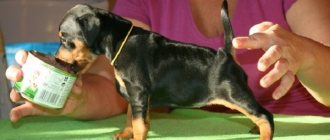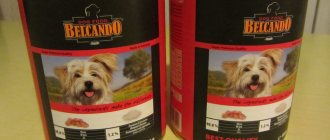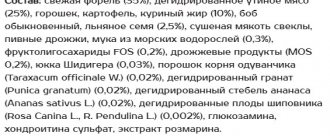Pregnancy is stressful
Despite how easy pregnancy is for a dog, it is worth remembering that expecting offspring is a huge stress for the animal’s body. A lot changes: hormonal levels, load on the heart and vascular system; Due to the rapidly increasing volume of the uterus, the location of the internal organs temporarily changes, and the load on the musculoskeletal system increases.
The first rule of feeding a dog during pregnancy is no sudden changes in diet. Changing food, and even more so changing the type of feeding, is also stressful. And you shouldn’t put one on top of the other, putting the health of the dog itself and future offspring at risk. At least in the first third of pregnancy, the diet is left unchanged.
WARNING - Two common mistakes made by breeders.
One of the common mistakes made by breeders is overfeeding during pregnancy.
Although pregnancy is a time of growth, if your bitch was eating properly before pregnancy, her nutritional requirements now remain the same. Of course, she doesn't need mountains of food, more and more. Only a little more at the end of pregnancy.
Overfeeding during pregnancy will lead to obesity in the bitch.
And she will have a very difficult birth. Underfeeding during lactation will cause her milk to be depleted, the puppies will not grow well, and the bitch will emerge from the lactation period dangerously malnourished, which will jeopardize her health.
However, don't go from one extreme to another.
Do not underfeed your bitch during pregnancy because no matter how well she has eaten before, a poor diet during pregnancy will result in more stillborn puppies and those born alive will not be strong enough to survive due to malnutrition. Their muscle tone and ability to survive will be significantly reduced. So please don't be greedy when your bitch is pregnant, but don't overfeed her either.
The second common mistake made by breeders is underfeeding the bitch during lactation. But we'll talk about this in chapter seven.
The main thing is animal proteins
In this case, it does not play a special role what type of feeding your pet is accustomed to. It is only important that the diet is balanced in essential nutrients. It is worth recalling here that the basis of any diet for dogs should be animal proteins.
A shift towards fats and carbohydrates, which provide the energy content of low-quality industrial feeds, only leads to the dog gaining excess weight. In addition, a lack of protein can lead to abnormalities in the development of fetuses, regardless of whether you are going to feed a pregnant Toy Terrier or Shepherd dog.
6-9 weeks of pregnancy
Around day 42, two major changes begin to occur:
- Your pregnant bitch's energy and nutritional needs begin to increase as the fetus's growth accelerates.
- The space she has to accommodate this food in her stomach begins to decrease as the fetus begins to take up more of her stomach.
For these reasons, it is important that you regulate her feeding at this stage.
If you've had her scanned (using an ultrasound at the vet), you can know approximately how many puppies to expect, and this can also help with feeding. If you know she's expecting a large litter, she'll need extra energy and nutrients, whereas if she's only expecting one, you may have to be more careful with the amount you feed so the litter doesn't get too big.
About choosing a diet for pregnant dogs
If you are truly concerned about the health of your pregnant dog and future puppies, it would be a good idea to contact a veterinary nutritionist. In the case of preparing a diet from natural food, only a professional will be able to select a specific diet for a pregnant Yorkie or Labrador.
When preparing a diet, the specialist will take into account the condition of the animal, the overweight or underweight of the expectant mother, and will be able to give recommendations on the number of feedings, the composition and volume of portions, and the need to add minerals and vitamins to food. This will help not only the correct intrauterine formation of fetuses, but also future feeding.
If your dog eats industrial food, the right option would be to contact the specialists of the manufacturer. As a rule, most manufacturers of dry food or canned dog food have diets in their lines that are ideal for pregnant bitches.
Natural food or feed?
An age-old question that dog owners cannot solve. What to feed your pet? Natural food seems to be healthier. But the food is cheaper.
This is wrong. Cheap food is bad food. Food for pregnant and lactating dogs must be balanced in composition. What is the composition of economy class feed? There's no meat there. Only ground bones, proudly called “bone meal”. Dyes and flavor enhancers. That's the whole lineup. Will such food bring much benefit to the expectant mother and her puppies? Hardly.
Natural food makes the dog “loose”. If you overfeed an animal, there is a risk of difficult birth. Especially for those bitches who are whelping for the first time.
Let's talk in more detail about the advantages and disadvantages of both natural food and dry food.
Beware of overfeeding
If you decide to rely on your own resources and knowledge, it is worth remembering that overfeeding during pregnancy is worse than underfeeding. Firstly, an excess amount of food leads to obesity in the dog (especially for breeds prone to gaining excess weight, such as pugs and Rottweilers), which, in turn, leads to a weakening of labor and increased stress on various body systems.
Secondly, excess nutrients cause enlargement of the fetus and possible problems during childbirth. In addition, it is completely unnecessary to feed your dog vitamins, micro- and macroelements on your own. At best, such actions simply will not have the slightest benefit.
Why changing your diet is vital
After mating, the dog’s body changes and adapts to the puppies. Of course, unconditioned reflexes and instincts “work” in the interests of the mother’s health, but there are exceptions. If the body cannot cope in the early stages, the pregnancy fails. In recent weeks, the mother “sacrifices” her own resources for the survival of the offspring, which leads to complications in the postpartum period.
The main danger is calcium deficiency, which leads to eclampsia (milk fever). Eclampsia is a “terrible”, often fatal disease associated with a rapid drop in calcium levels in the blood. Magnesium is absorbed only in combination with calcium and is a vital element for the functioning of the central nervous system, but its excessive consumption harms the dog’s reproduction in the future. A special risk group is Yorkies, Chihuahuas and other miniature breeds.
Naturally, eclampsia is not the only threat to the health of the expectant mother; the immune system, which operates at high speed, weakens without proper support. The pet becomes vulnerable to almost all diseases, including inflammatory processes of the uterus and genitourinary system.
Feeding in the first half of pregnancy
In the first three weeks after mating, the dog is fed with regular portions according to the usual schedule - twice a day, and there is no need to reduce the dog’s physical activity. This will help keep the animal's muscles in good shape and also prevent excess weight gain. However, the load should be dosed, avoiding excessive fatigue of the expectant mother.
If you decide to change the type of feeding of the animal or switch it to another food (many manufacturing companies recommend switching the dog to a more energy-rich food during pregnancy, for example, using puppy food), then it is better to do this in the first half of pregnancy. In this case, the transfer should be carried out gradually, over a period of at least 7–10 days.
Nutrition after childbirth
It is extremely important to calculate the amount of food for a nursing bitch based on:
- Number of puppies;
- Dog activity;
- Metabolic rates;
- Milk feeding time;
- Dog size.
When to feed a pregnant dog intensively
The second half of pregnancy, or rather its last third, is characterized by increased fetal growth. By 5–6 weeks of pregnancy, puppies have already formed internal organs and basic body systems. From this moment, the actual active growth of the fruit begins.
If previously most of the nutrients, and especially their excess, were spent on providing the mother’s body and storing fat “in reserve,” then in the last third of pregnancy the mother’s body gives almost everything to the future offspring.
Therefore, it is very important, starting from the 6th week after mating, to gradually increase the dog’s diet so that by the end of pregnancy the bitch receives approximately 25–30% more food than usual.
When to make nutritional adjustments
It is not necessary to increase the caloric content of the diet immediately after mating, since the dog will have toxicosis, due to which it will, in principle, eat little. After the first month it should become easier and then you can make nutritional corrections.
In order to do this correctly, you need to increase the amount of feed gradually: first by 15%, then by 15%. And so on every week. As a result, the volume should be increased by 60% of what your pet ate before.
- If you feed your dog natural food, then you need to supplement the diet with vitamins and minerals. They can be given literally from the very beginning of pregnancy.
- If your pet ate commercially produced food, then from the fifth week of pregnancy you should switch her to special food for pregnant dogs. It is also important to provide your dog with open access to clean water.
- Better feed your dog more often. Since this will make it easier for her to digest food and this approach will prevent constipation.
It is important to note that if your dog has stopped eating and is only drinking, and there is little time left before the puppies are born, then this is normal. After the puppies are born, their appetite will be restored within a few days. And the bitch will be able to eat normally again.
Often and little by little
It is not uncommon for dogs to experience a temporary decrease or even a short-term lack of appetite during pregnancy. This is completely normal and should not cause undue concern to the owner.
The way out of the situation is to provide the animal with free access to food throughout the day. As soon as the dog feels a little better, he will eat on his own. If for some reason the bowl cannot be left filled with food all the time (for example, if there are other pets in the house and food competition), organize frequent split feedings for the expectant mother.
In this case, food is given in small portions, but as often as possible. Remember that the pregnant uterus puts a lot of pressure on the internal organs and simply physically does not allow the dog to eat much. A lack of food will lead to the birth of weakened, low-viability offspring and will negatively affect the mother’s future lactation.
The key to a successful pregnancy is good preparation.
The success or failure of any breeding result will depend on how the bitch has been fed throughout her life.
During pregnancy, she will be supported by those substances in her body that she accumulated long before pregnancy. It is her past nutritional history that will have a huge impact on whether the bitch gets pregnant, carries the entire pregnancy to term, and delivers and nurses a full, multiple litter without problems. If your bitch has a history of eating a poor, incomplete diet, such as commercial dog food, or a home-cooked incomplete diet, then there will be big problems. The bitch may not get pregnant at all. Or she will be able to get pregnant, but the fetuses will be miscarried, or defective puppies will be born. Keep this in mind when starting your breeding program.
Less treats, more water
During this period, it is better not to experiment with new foods, and also to limit treats, especially from the table - most human food contains ingredients that can harm the body of both dogs and puppies.
Separately, it is worth mentioning about water. Drinking should be available to the dog at all times. It is strictly forbidden to limit an animal's access to clean drinking water during pregnancy.
By and large, regardless of the size and breed - it is a miniature pinscher or a St. Bernard, feeding a pregnant dog correctly, as most experts agree, means following the above principles. It goes without saying that you will feed your Yorkie or Labrador with different amounts of food.
What about vitamin and mineral supplements?
If your bitch is fed a suitable, complete and balanced commercial diet, no vitamin or mineral supplements will be required during pregnancy. The only exception to this rule may be otherwise if specifically prescribed by your veterinarian.
In fact, supplements can be harmful. For example, excessive calcium intake can suppress a bitch's parathyroid gland (a gland that is important for mobilizing and balancing calcium in the body) and lead to eclampsia (when the uterus does not contract properly during labor).
Feeding a pregnant bitch, what and how many times to feed
4.3 / 5 ( 10 votes)
The feeding of a pregnant bitch and the conditions under which she is kept largely determine the health of future puppies, not only immediately after their birth, but throughout their entire future life. These factors also affect the timing of birth. A well-fed bitch living in good conditions gives birth easier and earlier than other dogs.
The diet of a pregnant bitch should be carefully thought out. Of particular importance in this case is not the quantity, but the quality of the food fed. Constantly monitoring your dog may require repeated changes in diet.
One of the typical mistakes when preparing a diet is the owner’s desire to use more high-calorie food from the first days of the dog’s pregnancy. This leads to overfeeding the bitch, to additional stress on her heart, liver and kidneys, and to a decrease in her mobility.
If the dog’s diet before mating was sufficiently balanced, then there is no need to make any significant changes to it in the first four weeks of pregnancy. You should definitely include raw meat and raw egg yolks in your diet. This is also useful if the bitch is fed concentrated special food.
From the first days of pregnancy, the bitch needs food with a high content of easily digestible animal protein. It is proteins of animal origin, and among them some essential (that is, not formed in the dog’s body) amino acids, that are primarily the “building material” for the development of new living beings. A large number of such proteins are found in fish and dairy products, which are also rich in calcium and phosphorus.
If eating dairy products causes stomach upset in your bitch, you can try cooking them first. Many dogs enjoy eating cheesecakes, cottage cheese casseroles, omelettes, etc. Fresh milk, as a rule, is poorly absorbed by adult dogs, so it is better to use fermented milk products, soft and hard cheeses as a source of calcium.
It is very beneficial to give eggs to dogs, and large breed bitches can be fed up to two eggs a day during pregnancy. The yolk of a chicken egg can be consumed both raw and boiled, but it is better not to give raw whites to the bitch as they contain substances that prevent the dog’s body from producing one of the B vitamins - biotin.
From the first days of pregnancy until giving birth, the bitch must be given vitamin supplements. It is especially important that your dog regularly receives vitamins A, B and E.
Read more: Avitaminosis and hypovitaminosis in dogs, manifestations and treatment.
B-vitaminosis in dogs: manifestations, causes, treatment.
The amount of carbohydrates consumed, especially for bitches prone to obesity, must be significantly reduced by excluding flour products, sweets and high-calorie cereals from their diet.
To ensure that the dog receives a sufficient amount of ballast substances necessary for normal digestion, cereal products can be replaced with raw and boiled vegetables (except potatoes and legumes).
The amount of fluid consumed by the bitch should not be limited. Increased kidney function increases the need for fluid, and in addition, the bitch’s body needs it to produce fluid that fills the membranes.
In the second half of pregnancy, intensive growth of the embryos begins. The embryos develop a skeleton and coat, and their size and weight increase significantly. Future puppies receive all the components necessary for this from their mother, depleting her body primarily of calcium, proteins, and vitamins. Therefore, the bitch’s diet in the second half of pregnancy should be changed both quantitatively and qualitatively.
Firstly, the number of feedings of the dog should be gradually increased to three, and at the very end of pregnancy - to four times a day.
The food must be complete in terms of protein and mineral supplements. The dog's diet must include bones, preferably veal bones. This, among other things, will help cleanse her teeth of plaque and prevent the formation of tartar.
To compensate for the loss of calcium and phosphorus in the bitch’s body, she needs to be given appropriate medications daily, for example calcium glycerophosphate. It should be borne in mind that in the absence of phosphorus, calcium is poorly absorbed by the body.
To eliminate the lack of B vitamins in the feed, brewer's yeast can be introduced into the diet. The best source of vitamins A and D is fish oil, which comes in capsules and can therefore be easily fed to your dog.
Sometimes during pregnancy, a bitch becomes deficient in vitamin C, which manifests itself in the form of non-infectious skin diseases or anemia. In this case, on the recommendation of a veterinarian, the dog must be given special medications.











